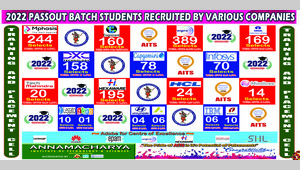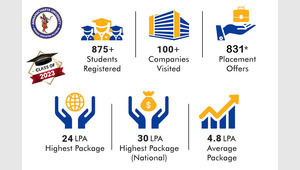WEB COUNSELLING CODE: AITSPU AISHE Code: U-1389
WEB COUNSELLING CODE: AITSPU AISHE Code: U-1389
- Home
- About
-
-
-
Annamacharya University remains adaptable to the evolving demands in education, consistently updating its diverse curriculum to equip students for the future workplace. The integrated learning methodology encompasses a wide array of courses, including Engineering, Management, Sciences, Agriculture, Paramedical Sciences, Humanities, and Social Sciences etc.,.
-
-
-
-
About Us
- University
- Vision-Mission
- Quality Policy
- Management
- Advisor
- Sponsoring Body
Statutory Authorities
University Act
Administration
- Deans
- Committees
- Service Rules
- Ombudsperson
- Controller of Examinations
- Chief Vigilance Officer
- Finance Officer
-
-
- Schools
-
- University
-
-
Academics
- Faculty
- Roll Number Format
- Academic Calendar
- Academic Regulations
- Course Structure & Syllabus
- University Handbook
- Orientation Program
- Notifications
- Guidelines to PhD Students
- Fee Refund Policy
Examinations
Facilities
Student Corner
-
-
- Research
-
-
The Written Examination for Ph.D admissions (Academic year 2025-26) is postponed to 19/7/2025 with the same Schedule.

The last date for submission of Ph.D Applications is extended up to 30/6/2025
The written Examination for Ph.D admissions (Academic year 2025-26) will be conducted from 9.30 AM to 11.30 AM on 12/07/2025. followed by interview on the same day.
- Ph.D Notification
- Ph.D. Eligibility Criteria
- Offered Ph.D Programmes
- Apply
- RESEARCH ADMISSION TEST & SYLLABUS-2025-26
- Inviting Applications for Research Supervisors from other Universities/Institutes/etc
- Specializations and Domains
- Research Fee Notifications
- Instructions to Students Attending Research Interview
- PhD Course Work Registration Form
- Approved Supervisors 2025-26
-
The Following two Subjects are mandatory for scholars of all the departments.
- Research Methodology
- Research and Publication Ethics
-
The Subjects related to Respective Departments
- Overview
- Vision, Mission and Objectives
- Directorate of Research
- Policy
- University Research Board
- Research & Development Cell
- Publications
- Patents
- Conferences
- Development programs
- Rules and Regulations
- Approved Supervisors
- Research Scholars
- Awarded
- Thrust Area
- MoUs
- Consultancy
- Multi-Disciplinary Research
- Awards And Recognition
- Events
The Written Examination for Ph.D admissions (Academic year 2025-26) is postponed to 19/7/2025 with the same Schedule.

The last date for submission of Ph.D application is extended upto 30/06/2025
The written Examination for Ph.D admissions (Academic year 2025-26) will be conducted from 9.30 AM to 11.30 AM on 12/07/2025. followed by interview on the same day.
- Ph.D Notification
- Ph.D. Eligibility Criteria
- Offered Ph.D Programmes
- Apply
- RESEARCH ADMISSION TEST & SYLLABUS-2025-26
- Inviting Applications for Research Supervisors from other Universities/Institutes/etc
- Specializations and Domains
- Research Fee Notifications
- Instructions to Students Attending Research Interview
- PhD Course Work Registration Form
- Approved Supervisors 2025-26
-
The Following two Subjects are mandatory for scholars of all the departments.
- Research Methodology
- Research and Publication Ethics
-
The Subjects related to Respective Departments
- Overview
- Vision, Mission and Objectives
- Directorate of Research
- Policy
- University Research Board
- Research & Development Cell
- Publications
- Patents
- Conferences
- Development programs
- Rules and Regulations
- Approved Supervisors
- Research Scholars
- Awarded
- Thrust Area
- MoUs
- Consultancy
- Multi-Disciplinary Research
- Awards And Recognition
- Events
-
-
- Admissions
-
-
- PG Programs at AU
- Admission Procedure
- Admission Requirements
- Fee Structure
- PG Programs at AU
- Admission Procedure
- Admission Requirements
- Fee Structure
-
-
- Placements
-
-
- Logos of COE companies and their benefits
- Logos of COE companies and their benefits
-
-
- Downloads
-
-
Downloads
- E-Brochures
- Newsletters
- Event Gallery
- Question Bank
- Manuals
- Media
- Self Appraisal
- Important Links
- CL Application Form
- On Duty Form
- Hostel food Request Form
-
-
- Careers@AU





